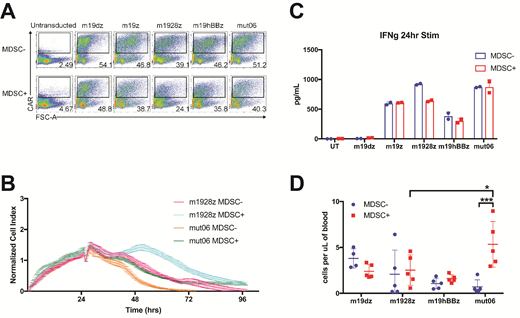CAR T cells are genetically modified with an extracellular scFv, transmembrane domain, and intracellular costimulatory and CD3ζ domains. Two treatments received the approval from the FDA for the treatment of acute lymphoblastic leukemia and diffuse large B cell lymphoma. However, CAR T cell persistence remains a problem. A reason for this may be that myeloid cells such as myeloid derived suppressor cells (MDSCs) may be contributing to the reduced persistence of CAR T cells. MDSCs originate from myeloid cells and have been implicated in the suppression of the immune system in the tumor microenvironment.
To determine what effect MDSCs might have during CAR T cell production we co-cultured MDSCs during CAR transduction. We found gene transfer was lower for m19z (38.7% vs 46.8%), m1928z (24.1% vs 39.1%), and m19hBBz (35.8% vs 46.2%) CAR T cells co-cultured with MDSCs compared to those that were not (Fig 1A). There was also a reduction in total T cell counts for m19z (58%), m1928z (88%), and m19hBBz (65%) after MDSC co-culture. This data suggests MDSCs present during CAR T cell production can alter gene transfer and total T cell counts.
We also investigated the effect MDSCs can potentially have on CAR T cells when present during CAR T cell antigen stimulation. CAR T cells co-cultured with MDSCs in vitro had significant reductions in m19z, m1928z, and m19hBBz CAR T cell mediated killing against target cells (Fig 1B). We also found significantly lower production of IFNγ in m19z, m1928z, and m19hBBz CAR T cells cultured with MDSCs compared to cells cultured with total BM (Fig 1C). After 24hr stimulation with MDSCs and target cells, there was lower expression of activation markers PD1 and LAG3 by CAR T cells compared to culture without MDSCs. This suggests that MDSCs reduce CAR T cell activation, killing, and cytokine production. We also looked at how CAR proliferation after antigen stimulation is affected by MDSC co-culture and found MDSCs significantly reduced CAR proliferation in vitro.
To evaluate if we could create a more resistant CAR T cell to MDSC suppression null mutations were incorporated into a CD28 CAR. We mutated the YMNM and PRRP subdomains of CD28 which signal through PI3K and ITK respectively leaving only PYAP active (mut06). When MDSCs were co-cultured with mut06 T cells during production mut06 had a smaller reduction in gene transfer (21% vs 38%) and T cell counts (80% vs 88%) compared to m1928z. Mut06 also had a significantly higher expression of PD1 and TIM3 compared to m1928z after production with MDSCs. In vitro when mut06 was co-cultured with MDSCs it had the same killing ability as m1928z without MDSCs and was significantly better at killing compared to m1928z co-cultured with MDSCs (Fig 1B). To examine the effect of MDSCs on CAR T cells in vivo we injected C57BL6 mice with CAR T cells followed by MDSCs a week later. In these ongoing experiments we found mut06 had significantly higher numbers of CAR T cells in the blood compared to m1928z (Fig1D). Overall our data shows that MDSCs can suppress CAR T cell function when present during production as well as CAR stimulation. It also suggests that by optimizing CD28 CAR signaling using mut06 that we were able to generate a CAR T cell that is more resistant to MDSCs. Furthermore, we may be able to recapitulate the effect of mut06 with targeted inhibitors.
Davila:GlaxoSmithKline: Consultancy; Novartis: Research Funding; Adaptive: Consultancy; Celgene: Research Funding; Precision Biosciences: Consultancy; Bellicum: Consultancy; Anixa: Consultancy; Atara: Research Funding.
Author notes
Asterisk with author names denotes non-ASH members.


This feature is available to Subscribers Only
Sign In or Create an Account Close Modal